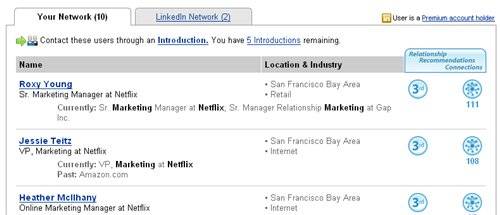Dan Farber talked to LinkedIn founder and Chairman Reid Hoffman on Friday at the Supernova 2007 conference, and was told that over the next 9 months LinkedIn will deliver APIs for developers. It seems that LinkedIn has been hurried onto this open track due to the hype surrounding Facebook’s new open platform. Dan also reports that LinkedIn wants to “create a way for users who spend more time socially in Facebook to get LinkedIn notifications.” Nick O’Neill has a post discussing the ramifications.

Of course I agree that opening its platform to developers is the best (the only?) way for LinkedIn to take its service to the next level. Interestingly Alex Iskold wrote about this back in January, and his post then is well worth re-visiting now.
Alex first analyzed LinkIn’s current features, then he suggested some new ones that LinkedIn, or external developers via APIs, might want to introduce:
Notably absent are features that let the users feel the network. For example, it would be great to see a visualization of all of my connections as a network; and on a map. It would be also great to be able to explore my network, using a visualization technique like Thinkmap. Another more subtle thing that is missing from LinkedIn is the strength of the relationship. Not all of my connections are equal, some are much stronger than others. This is a very valuable piece of information that can help a lot with things like lead generation. It is not easy to capture the strength of the relationship, but even a trivial heuristic like ‘number of times I’ve clicked on someone’s profile’ would be a good start.

Alex concluded (and remember this was mid-January, before Facebook announced its open platform in May):
Today Facebook is much more about interactions and staying in touch – on a practical basis – daily. LinkedIn is about staying connected over longer periods of time and leveraging business connections for business purposes. It seems to us that LinkedIn needs to evolve more towards the Facebook model, where people can interact more on the site via profiles. Unlike Facebook, the interactions between individuals on LinkedIn cannot be open to all – but the idea that people interact on the site is important, because this is what keeps them coming back.
What do you think about LinkedIn and how it can compete with the increasingly powerful Facebook?

















